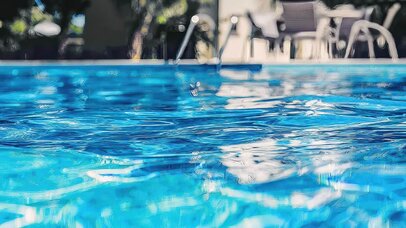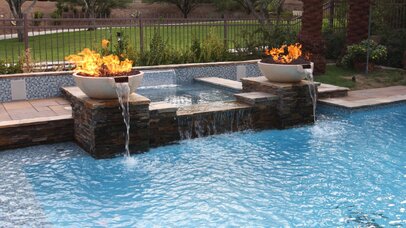If you have a private pool in the backyard, you already have something to boast about. Take it a notch higher with solar heating!
Surprise your friends with a solar heating system when the temperatures drop, and it becomes difficult to get into a pool. Unlike electric or gas-powered options, this is a sustainable method that you can opt for.

Now, solar heating comes with its set of pros and cons. We will discuss all of them in the following parts. First, let us tell you about the two popular systems, and then we will move on to the advantages and costs.
So, without further ado, let’s dive in!
Solar Pool Heating Fundamentals
Types Of Solar Pool Heating
There are two major types of solar heating systems that you should know about. These systems are popular in Australia; you will find them with significant pool maintenance companies. They are as follows:
Panel Collectors
This will be a better choice if you live in a cold area. Yes, it is more expensive, but it is way more efficient when heating water. The pipes here pass through a body that is made of semi-rigid polypropylene. This keeps the lines stable and prevents them from moving even when windy. They are windproof and hence more durable.
Often, copper, glass, or aluminium is used so that the water stays hot and warms up faster. This system is needed in cold places to ensure you can swim even after the sun is down.
Strip Or Ribbon Collectors
Here, the pipes are placed in a body made of plastic or rubber. These are more flexible than the previous type and hence show versatility. It can be fitted onto multiple surfaces but has a drawback. This system is not very effective in heating water and is suitable for only tropical or slightly warmer climates.
Advantages Of Shifting To Solar Heating
Some of the top benefits of preferring a solar heating system have been discussed in this section.
Limited Running Expenses
Solar heating systems with heat pumps are much more cost-effective than gas heaters, which use non-renewable energy sources. After the initial installation cost, you will see huge savings on your energy bills because solar pools draw the sun’s free and abundant heat to raise the pool temperature without powering gas heating. Maintenance is also minimal as there are no flames or equipment beyond the heat pumps and solar collectors to power. The longest ongoing cost may be the occasional cleaning of the solar panels to ensure maximum system efficiency.
Longer Swimming Sessions
With solar-heated water and heat pumps, you can enjoy dipping into the pool at the desired temperature much later into the season or earlier in the spring. Poor weather will no longer cut short your swimming. Instead, grey and drizzly days can provide enough sunlight to keep the pool water temperature usable well after the summer months through solar heating and heat pumps. Families will make the most of any free moment together outside, even on transitional days between seasons.
Extended Warranty Periods
Longer warranty coverage of up to 12 years protects the system components like the heat pumps and solar collectors for over a decade. This suggests the manufacturer has confidence that the solar pool heater components are built to last if properly maintained. Most gas pool heaters only ensure their functionality for 2-4 years, leaving the homeowner responsible for replacement costs much sooner.
Environment Friendly
By relying on clean, abundant sunlight captured by solar collectors rather than fossil fuels or electricity from the grid, solar pool heating with heat pumps is a sustainable choice that maintains the desired pool temperature. It produces no pollutants or emissions in operation. Choosing solar avoids gas heating and its impacts. This benefits the weekly users and results in fewer greenhouse gases over the lifetime of the system and pool.
Factors Determining The Cost Of Solar Heat A Pool
It would be best to consider these factors while determining the running costs. Read on to learn about the annual running costs to heat your pool.
Pool Size
What is the kind of pool size that you want to heat up? If you have a small pool, that could cost you between $3,000 to $4,500. On the other hand, having a bigger pool might cost you up to $6,000 to $6,500. The system costs around $1,000 to $5,000, but the installation charges can take $8,500.
Pump
Water circulation in a solar heating system will require a pump. According to the Swimming Pool and Spa Association of Australia (SPASA), an older pump can be used for a new system if it fits right. The criteria for the perfect fit include water pressure, flow rate, and capacity that a pump can handle.
If your old pump does not meet these criteria, you must buy and install a booster pump. A pump is not required for cold water circulation as that will reduce the water temperature inside a pool. For this reason, you need to attach a temperature sensor control device. This will only allow water to circulate only when it is heated up.
Now, if you are wondering about the price of the pump, a booster model will cost you around $300. This might vary slightly depending on your locality and the rates there. A temperature sensor device will cost you another $300. We highly recommend it if you are not home most of the day and there is no one to regulate the working of your pump.
Maintenance
If you are concerned about sustainability and want to save a few bucks, you must maintain the pool. As the NSW Government Department of Planning and Environment and the SPASA say, a solar pool heating system must be kept to maintain efficiency.
You either need to hire a professional or do it yourself. Cleaning filters is the most crucial part. Clogged filters can cause the machine to work overtime, which will, in turn, lead to more power consumption.
You will need to have proper pool covers, lighting, filters, and pumps, and these can get adequate certification from SPASA if they meet the desired criteria. The more innovative and efficient your system is, the more chances you will achieve this certification.
Is Solar Heating Economical?
We feel that solar pool heating is very economical in the long run. Yes, it will cost you initially, but there are almost negligible expenses once you install it. This is because a solar heating device does not consume any electricity. Hence, it is cheaper than electric and gas-powered devices.
Not only so, but it is also very beneficial for the environment and saves a lot of pollution. While gas and electricity are limited, solar heating will help build a more sustainable environment.
Final Thoughts on Solar Pool Heaters
Although solar heating is highly beneficial for sustainable living, it would not be right to expect results similar to those of an electrically heated pool. For instance, you will not swim in proper winter months, and the upfront expenses are much higher.
So, think again if you plan to install a solar-heated pool for winter! If not, then you are on the right track. This is perfect for other months and will ensure that you always have a warm and welcoming pool.
With this, we have come to the end of this guide, and we are sure you know how much it will cost. Remember that you need to calculate all the other costs and the price of a system. Since the installation itself could cost more than $2,000, you must plan your budget before settling for one.
Let us know if you still have any queries. Until next time!



